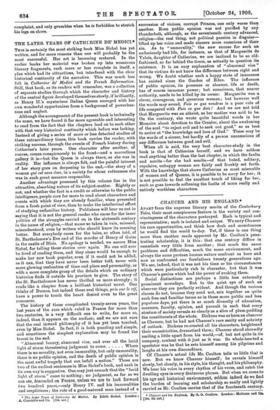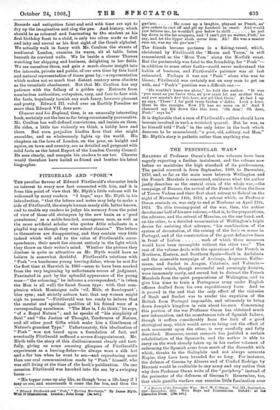CHAUCER AND HIS ENGLAND.*
APART from the supreme literary merits of the Canterbury Tales, their most conspicuous feature is the variety and con- vincingness of the characters portrayed. Each is typical and representative ; each is isolated and unique. We envy Chaucer his rare opportunities, and think how drab and monotonous he would find the world to-day. Yet, if there is one thing more than another made apparent by Mr. Coulton's pene- trating scholarship, it is this : that one century differs in essentials very little from another ; that much the same problems and difficulties, much the same environment, and always the same protean human nature confront us here and now as confronted our forefathers twenty generations ago. We see, indeed, that it was not his time or his circumstances which were particularly rich in character, but that it was Chaucer's genius which had the power of evoking them.
Social distinctions are perhaps a little less externally prominent nowadays. But to the quiet eye of such an observer they are perfectly evident. And though the various classes do not, because they need not, mix together on quite such free and familiar terms as in those more public and less populous days, yet there is so much diversity of education, manners, faculty, opinion, and pursuit in each that every stratum of society reveals as clearly as a slice of plum-pudding the constituents of the whole. Dickens was as keen an observer as Chaucer, but he had not Chaucer's rare sanity and sobriety of outlook. Dickens re-created all his characters, heightened their eccentricities, dramatised them ; Chaucer stood shrewdly smiling a little apart from his world,—of, but not quite in its company, content with it just as it was. So whole-hearted a spectator was he that he sets himself among his pilgrims and laughs at his own discomfiture.
Of Chaucer's actual life Mr. Coulton tells us little that is new. But we know Chaucer himself ; he reveals himself slowly, but closely, in his style, his thought, and his philosophy. We hear his voice in every rhythm of his verse, and catch the dwelling eyes in every dexterous phrase. But when we come to his age and historical environment, seldom indeed do we find the burden of learning and scholarship so easily and lightly carried as Mr. Coulton carries that of the fourteenth century.
• Chaucer and his England. By G. G. Coulton. London: Methuen and Co. [10s. 6d. net.]
Records- and antiquities faint and arid with time are apt to dry up the imagination and clog the pen. And history, which should be as coloured and fascinating to the student as his first birthday feast to a child, is only too often made as dull and inky and unreal as his first sight of the Greek alphabet. We actually walk in fancy with Mr. Coulton the streets of mediaeval London, examine its wares, sit at table, listen beneath its creviced walls. We lie beside a clearer Thames watching her shipping and business, delighting in her fields. We see ourselves there, and gain a much clearer insight into the interests, private and public, of our own time by this lucid and natural representation of times gone by,—a representation which makes not so much that distant century seem obsolete as the twentieth obsolescent. Not that Mr. Coulton Las any patience with the fallacy of a golden age. Extracts from numberless authorities, outspoken, racy, and face to face with the facts, hopelessly tarnish any such fancy, however pleasant and pretty. Edward III, ruled over an Earthly Paradise no more than Edward VII. does now.
Chaucer and his England, then, is an unusually interesting book, certainly not the less so for being occasionally provocative. Mr. Coulton has well-defined convictions, and insists on them. He rides, a little too violently we think, a hobby here and there. But even prejudice kindles fires that else might smoulder, and so wholesomely lights up the world. His chapters on the laws of London, on the poor, on knight and squire, on town and country, are as detailed and pregnant with solid facts as the latest Report of the London County Council. He sees clearly, and compels his readers to see too. Chaucer would therefore have hailed as friend and brother his latest biographer.















































 Previous page
Previous page